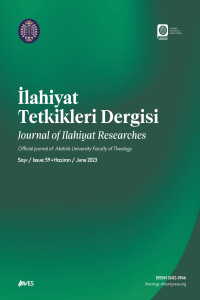God and Child: Children’s God Concept and Deadlock of Cognitive Stage Theories
God and Child: Children’s God Concept and Deadlock of Cognitive Stage Theories
Author(s): Rümeysa Nur DoğanSubject(s): Cognitive Psychology, Psychology of Religion
Published by: Atatürk Üniversitesi İlahiyat Fakültesi
Keywords: Psychology of Religion; Religious Thinking Development; Cognitive Stage Theories; God Concept; God Image; Child;
Summary/Abstract: Some scholars in the area of psychology of religion have stated that children until a certain age cannot comprehend God as a God but instead, they can concrete God in a superhuman format (anthropomorphic). However, some studies conducted with children have shown that most of the children at a young age can comprehend an abstract God image and can differentiate God’s features from humans. Therefore, this article will attempt to clarify how children’s God concepts have been explained in the developmental psychology of religion and how these theories illuminate the children’s abstract God concepts. To achieve this goal, the pastoral cycle was used as a method, which is a common one in pastoral and practical theology and consists of 4 stages: experience, analysis, theological reflections, and action. As a conclusion, regardless of their religion or cultural background, children’s minds may have the ability of receiving and comprehending the abstract God concept since birth. God can be understood as an all-present, formless, all-knowing, and allpowerful being by children. This illustrates that the religious thinking development of children has different explanations along with the stage theories including Piaget’s one, when the issue comes to the abstract religious entities and religious thinking.
Journal: İlahiyat Tetkikleri Dergisi
- Issue Year: 2023
- Issue No: 59
- Page Range: 54-60
- Page Count: 7
- Language: English

